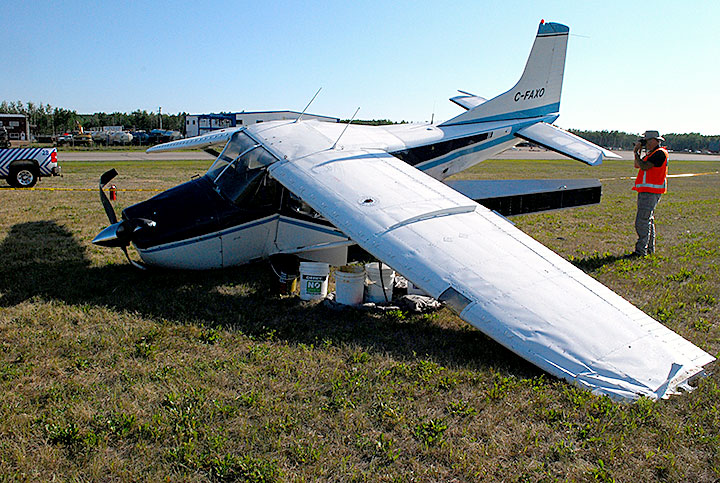Mid-air collision
between
W.M.K. Holdings Ltd. (dba McMurray Aviation), Cessna 172P, C-GJSE
and
Cessna A185E, C-FAXO
Fort McMurray, Alberta, 21 nm NE
The occurrence
The W.M.K. Holdings Ltd. (hereafter called McMurray Aviation) Cessna 172P (registration C-GJSE, serial number 17274696) was conducting a day visual flight rules instructional flight in the practice area northeast of the Fort McMurray, Alberta (CYMM) Airport. A privately operated Cessna A185E (registration C-FAXO, serial number 18501737), equipped with amphibious floats, was inbound to CYMM on a flight plan from Lloyd Lake, Saskatchewan. At 1917 Mountain Daylight Time, approximately 21 nautical miles northeast of CYMM, the 2 aircraft collided at 2800 feet above sea level (1300 feet above ground level). The collision separated the left float from C-FAXO and displaced the right float, which remained attached. The pilot, who was the lone occupant of C-FAXO, was able to land at CYMM. C-FAXO was substantially damaged, but the pilot was uninjured. C-GJSE broke up in flight; the student and instructor were fatally injured.
Media materials
News release
Investigation into June 2015 mid-air collision near Fort McMurray, Alberta, illustrates limitations of the see-and-avoid principle
Read the news release
Deployment notice
TSB deploys team to the site of an accident involving two aircraft near Fort McMurry, Alberta
Edmonton, Alberta, 22 June 2015 - The Transportation Safety Board of Canada (TSB) is deploying a team of investigators to the site of an accident involving two aircraft that collided mid-air. The accident took place near Fort McMurray, Alberta. The TSB will gather information and assess the occurrence.
Investigation information
Download high-resolution photos from the TSB Flickr page.
Class of investigation
This is a class 3 investigation. These investigations analyze a small number of safety issues, and may result in recommendations. Class 3 investigations are generally completed within 450 days. For more information, see the Policy on Occurrence Classification.
TSB investigation process
There are 3 phases to a TSB investigation
- Field phase: a team of investigators examines the occurrence site and wreckage, interviews witnesses and collects pertinent information.
- Examination and analysis phase: the TSB reviews pertinent records, tests components of the wreckage in the lab, determines the sequence of events and identifies safety deficiencies. When safety deficiencies are suspected or confirmed, the TSB advises the appropriate authority without waiting until publication of the final report.
- Report phase: a confidential draft report is approved by the Board and sent to persons and corporations who are directly concerned by the report. They then have the opportunity to dispute or correct information they believe to be incorrect. The Board considers all representations before approving the final report, which is subsequently released to the public.
For more information, see our Investigation process page.
The TSB is an independent agency that investigates air, marine, pipeline, and rail transportation occurrences. Its sole aim is the advancement of transportation safety. It is not the function of the Board to assign fault or determine civil or criminal liability.
